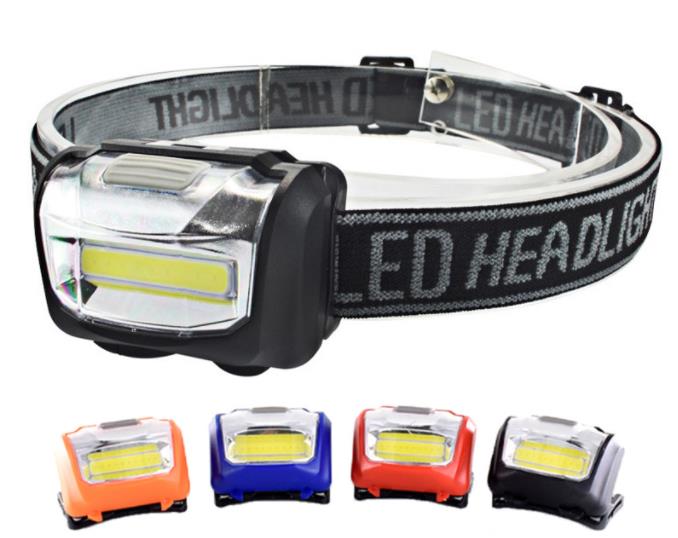
Outdoor dry battery headlamps offer a practical solution for your adventures. You can rely on them for activities like camping, hiking, and cycling. These headlamps provide consistent illumination without needing a charging station. They are easy to carry and use, making them ideal for various outdoor settings. However, you should consider their environmental impact due to battery disposal issues. Understanding these benefits and drawbacks helps you make informed choices for your outdoor experiences.
Pros of Outdoor Dry Battery Headlamps
Portability and Convenience
Outdoor dry battery headlamps offer unmatched portability. You can easily carry them in your backpack or pocket, making them perfect for spontaneous adventures. These headlamps do not require a charging station, which means you can use them anywhere. Whether you’re hiking in the mountains or camping in the woods, you won’t need to worry about finding a power source. This convenience allows you to focus on enjoying your outdoor activities without the hassle of managing charging equipment.
Availability and Cost
Dry batteries are widely available, making it easy for you to find replacements when needed. You can purchase them at most convenience stores, ensuring that you are never left in the dark. Additionally, outdoor dry battery headlamps are generally more affordable than their rechargeable counterparts. This cost-effectiveness makes them an attractive option for budget-conscious adventurers. You can invest in a reliable headlamp without breaking the bank, allowing you to allocate more resources to other essential gear.
Reliability
Outdoor dry battery headlamps provide consistent performance in various weather conditions. Rain or shine, these headlamps deliver dependable illumination, ensuring your safety during nighttime excursions. They serve as a reliable power source for extended outdoor trips, offering long-lasting light without frequent battery changes. For instance, the Black Diamond Spot 400 is known for its exceptional burn times, making it a trustworthy choice for night hiking and camping. With such reliability, you can confidently explore the great outdoors, knowing your headlamp will not let you down.
Cons of Outdoor Dry Battery Headlamps
Environmental Impact
Outdoor dry battery headlamps pose environmental challenges. You might face concerns about battery disposal and the harm it causes to the environment. Discarded batteries can leak harmful chemicals into the soil and water, affecting wildlife and ecosystems. Unfortunately, recycling options for dry batteries remain limited. Many communities lack facilities to process these batteries responsibly. However, some manufacturers participate in extended producer responsibility (EPR) programs. These programs aim to provide you with convenient ways to manage discarded batteries responsibly.
Limited Battery Life
You may find that outdoor dry battery headlamps have a limited battery life. Frequent battery replacements become necessary, especially during extended outdoor activities. This can be inconvenient and costly over time. Imagine being on a long hike and your headlamp suddenly runs out of power. Such situations can leave you in the dark unexpectedly. To avoid this, you need to carry extra batteries, which adds to your load. Planning ahead and monitoring battery levels can help mitigate this issue.
Weight and Bulk
Carrying spare batteries adds weight to your gear. You might notice the added bulk when packing for long trips. Multiple batteries take up space in your backpack, reducing room for other essentials. This can be particularly challenging if you aim to travel light. The extra weight can also affect your comfort during outdoor activities. You need to balance the need for reliable lighting with the desire to minimize your load. Consider the duration of your trip and the availability of battery replacements when planning your adventure.
Outdoor dry battery headlamps offer a mix of benefits and drawbacks. They provide portability, affordability, and reliability, making them suitable for various outdoor activities. However, they also pose environmental concerns and require frequent battery replacements. For short hikes, these headlamps offer convenience and ease of use. For extended camping trips, consider the environmental impact and the need for extra batteries. Choose a headlamp that aligns with your specific needs and values. By doing so, you ensure safety and sustainability during your adventures.
See Also
Selecting The Right Battery For Your Outdoor Headlamp
Common Issues Faced While Using Headlamps Outdoors
Should You Charge Or Use Batteries For Headlamps?
An In-Depth Guide To Outdoor Headlamps Explained
How Fast Charging Technology Shapes Outdoor Headlamp Innovation
Post time: Dec-06-2024
 fannie@nbtorch.com
fannie@nbtorch.com +0086-0574-28909873
+0086-0574-28909873





